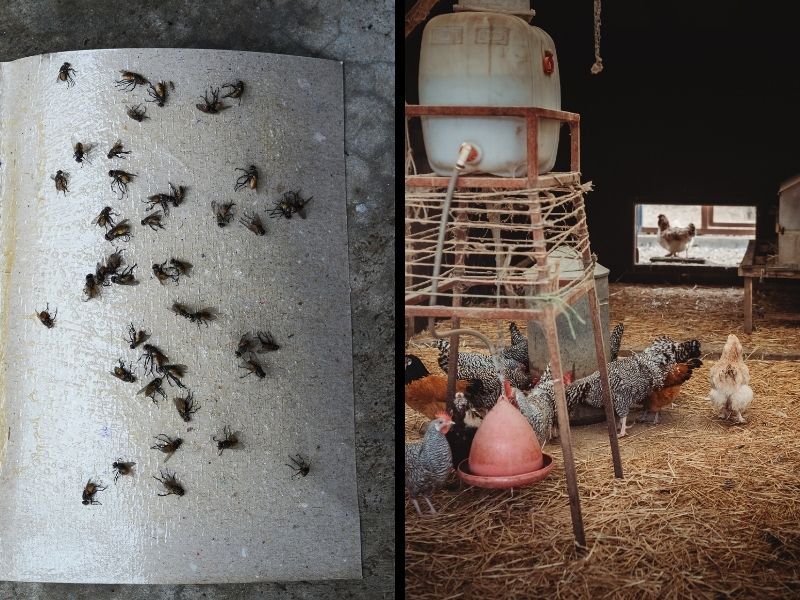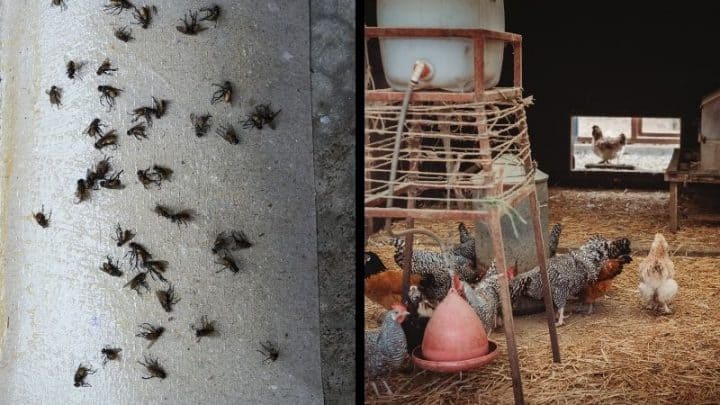Flies, the ever-present pests of summer … And if you own chickens, you know just how annoying they can be. If you wonder how to get rid of flies in the chicken coop, you’ll love our list of easy ways to take control of the fly population so you can have happy chickens!

How To Get Rid Of Flies In The Chicken Coop
1. A clean environment
Out of all the methods discussed in this article, a clean coop and surroundings are going to be the most important element of deterrence and prevention. Flies love dirty, stinky things and failure to keep your flock’s environment clean will quickly cause an infestation.
Flies love to lay their eggs in the trash, feces (chicken poop), and rotting food. If you keep a clean chicken coop and run you can reduce the amount of inviting places for flies to lay. A clean environment will certainly keep the numbers down, but will not get rid of flies entirely. Here are some other methods for controlling the fly population on your property.
Related: chicken coop must haves
2. Fly Traps
Yes, they’ve been around for many, many years, and for the most part, they are effective. There are several different types of traps that use various attractants to lure flies.
Fly paper
One of the simplest ways to kill flies is to hang some fly paper strips in your coop. The trick is to hang it where the chickens won’t be able to get to it.
So if you have a walk-in coop, you could hang it from the ceiling away from the perches.
An elevated coop might be trickier. This method uses a thin piece of paper coated with a sweet-smelling, sticky substance that flies can’t resist. They land on the paper and get stuck. The more they struggle the more they become stuck to the paper.
Typically, the fly paper is not very large, so it can only catch so many flies. If you have a small coop and a few chickens, this method may work for you. It is also one of the least smelly options. There are also some tutorials online that show you how to make your own fly paper at home.
Fly trap
There are several brands of fly traps on the market, but they all typically use a similar method to attract flies. This approach uses an attractant to lure flies into a trap where they are not able to get back out.
The attractant has a horrible odor and when a breeze hits it just right, can be quite unpleasant if you are standing downwind. I have personally used Farnam’s Trap and Toss and found it to be quite effective if not stinkier than I would prefer.
If you place them in less-traveled areas, that should help with the smell. I bought two and placed them outside of the run on tree branches. They stayed up all summer long and caught a ton of flies. If I do it again this year I may buy two more, for a total of four, to place on the other side of the run. They are fairly inexpensive and can be found at most box stores.
Related: How to raise chickens for eggs
3. Fly predators
These are small insects that are harmless to humans and animals but will attack and kill flies in the pupa stage. A female fly predator will lay eggs inside the cocoon of a fly pupa which then hatches and eat the pupa before it even gets the chance to become a fly. They are about the size of a gnat and are only effective at preventing flies before they are allowed to mature. So you will want to introduce them before the fly season really gets underway.
They are called Fly Exterminators on Amazon and come in quantities 5,000 or 10,000 predators. I have not yet tried this method but am tempted to, as it is a safe, environmentally friendly way to rid your coop and run of flies. Basically what you do is sprinkle the fly parasites near your manure or compost pile and then lightly cover them to protect from birds.
You’ll need your chickens to steer clear of the areas where you release the predators as they may scratch them up and eat them. You can also hang the release bags to protect from your birds if you free-range them. They will release themselves and cover about 100 yards of area. This is a great method if you have a large area and lots of birds.
4. Use herbs around the coop and run
Plant herbs around the outside of your run. Flies do not like the smell of lavender, basil, and mint to name a few.
This method alone will most likely not be enough to completely rid your coop and run of flies but it can’t hurt. Plus you’ll have some tasty herbs to add to your recipes and mint for your mojitos.
5. Plastic sandwich bags
There are two methods of deterrence with these bags, one is to fill the bag halfway with vodka and tie some twine around the top with the baggie still open. Hang near your coop. Flies do not like the smell of vodka and will steer clear of it.
The second method involves filling a quart-sized plastic bag halfway with water and dropping three or four shiny pennies in it. Seal the bag tight and hang it near the entrance to your coop. It has been said that because flies have large sensitive eyes, the pennies in the water appear magnified and distort the fly’s vision causing it to move away to a less visually irritating area.
6. Mow your grass regularly
Flies tend to lay their eggs in tall grass which holds moisture and offers protection for their young. Keeping your grass cut short will deter them from laying in your yard.
7. Remove standing water from around your coop and run
Flies need to drink water so be conscious of water pooling around your coop and run. Dump any water collecting in pots and items lying around your pen and coop. This is also a good practice to get into to keep mosquitos from laying their eggs.
8. Spiders
I know, most folks are terrified of them… but they can be a big asset in ridding your coop of flies. If the web is not in your normal path of travel, leave it be. Spiders love a juicy fly for dinner.
Some food for thought when deciding how to tackle flies this summer. Remember cleanliness is your first line of defense. And, if your girls can catch ‘em, flies make a tasty snack for your hens.
Happy chickening!

